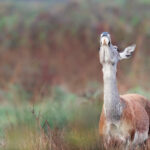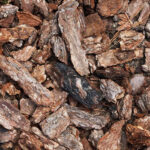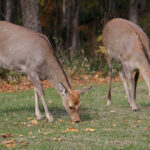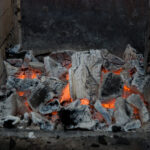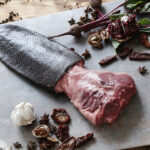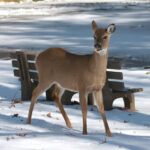To keep your dog safe, it is important to know which animals and which bones are safe for your dog to consume.
Whether you’re a hunter and a dog owner thinking of all the uses for a deer carcass, or a dog owner who lives in a rural area around deer, you may be wondering if venison bones are safe for your canine friend.
Let’s find out.
Table of Contents
- Are Venison Bones Safe For Dogs?
- Raw is Best
- Choosing The Right Bones
- Risks
- Safety Tips for Dogs
- Related Posts
Are Venison Bones Safe For Dogs?
Venison bones are a perfectly safe and tasty treat for your dog and chewing them can provide many your pooch with many positive benefits! Some of these include essential nutrients such as collagen, calcium, iron, and protein, improved dental health, and helping to combat boredom.
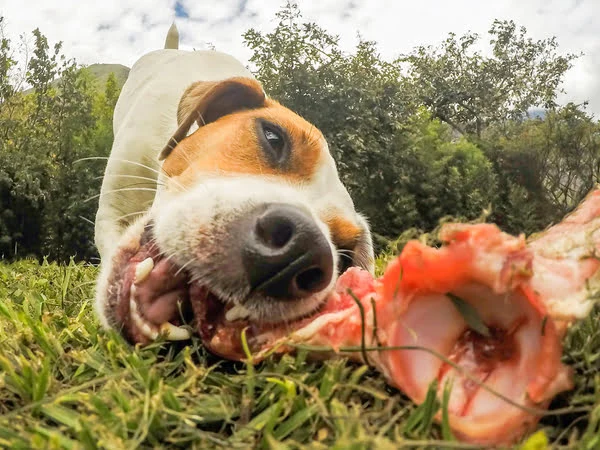
Raw is Best
When choosing venison bones, or any other bones that are safe for dogs to consume, raw bones are the safest and most nutritious option.
Many owners may instinctually think to boil or bake the bones to eliminate bacteria, but this actually makes the bones more soft and brittle and increases the chances for the bone to break or splinter, creating a choking hazard.
Raw bones, particularly large deer leg bones, are tough and long-lasting, providing your dog with many chew sessions on the tasty nutritious treat.
Serving them raw also preserves the nutrients, as much of them are lost in the cooking process.
Dogs have the capability of digesting more harmful bacteria than humans, which allows dogs to adopt a raw diet more easily.
It is important to store and handle the deer bones in a safe manner, and also monitor your dog to make sure they aren’t getting sick after chewing the venison bone.
If all looks good, a raw venison bone, especially with some meat left on it, is a great treat alternative for your dog.
Choosing The Right Bones
Choosing the right bone for your dog’s size is very important. Puppies and small dogs have a higher chance of fragments from large bones getting stuck in their throat. Large dogs should not be given bones that are smaller than their mouths, as they risk swallowing them whole.
Thankfully, there are a wide variety of venison bones that are appropriate for different dogs.
Larger dogs will need larger bones that are tough enough to withstand their chewing, while smaller dogs will need smaller, softer bones for their weaker bite and sensitive teeth.
Leg bones like the femur and tibia are long, smooth bones that work well for medium and large dogs.
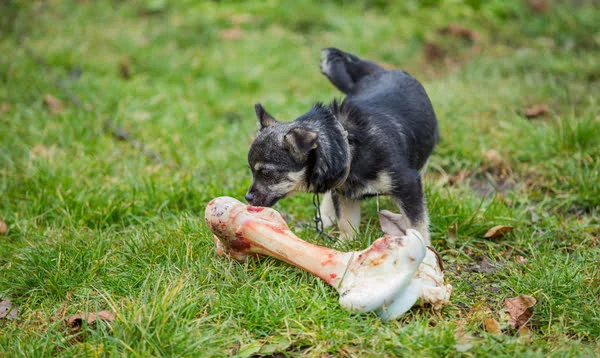
Also, the knuckles (epiphysis) at the end of each bone, as well as the knee caps are tough chewy cartilage that will occupy the more aggressive chewers.
Smaller dogs will need smaller bones (or flat bones) that you can get from the ribs, pelvis, or spine. These are softer bones that likely won’t damage your dog’s teeth and have less marrow that your smaller dog will have an easier time digesting.
Deer hooves are also a great option for dogs of all sizes. While they don’t contain as many nutrients, they are dense and tough and will provide hours of chewing.
Just be sure to monitor your larger dogs as they may be able to swallow one whole.
Risks
There are risks to consider when giving your dog a venison bone to eat. For that reason, it is best to monitor your dog, especially when you are introducing them to venison bones for the first time.
If your dog is an aggressive chewer, small fragments and sharp ends can present themselves quickly. If you notice any part of the bone has become a hazard for your dog, it’s better to take it away from them.
You also should not leave the same bone with your dog for too long.
Bones that have been chewed on and carried around for a long time have the risk of developing more harmful bacteria like salmonella.
You should limit your dog’s bone chewing sessions to around 30 minutes, and regularly check to make sure the bone hasn’t developed an odd smell or texture.
Also, especially at the beginning, monitor your dog’s health to make sure they’re not sick or there are no blockages.
Signs that your dog may have a blockage in its throat or intestine include vomiting, bloating, irregular bowel movements, loss of weight, or whimpering in pain.
Also, be sure to check your dog for broken teeth or an injured mouth.
Safety Tips for Dogs
Making the right choice of bone for your dog and supervising them while eating goes a long way in preventing any danger from venison bones.
With proper care, they are a safe and healthy treat that provides a wide range of health and behavior benefits that you and your dog will love!
